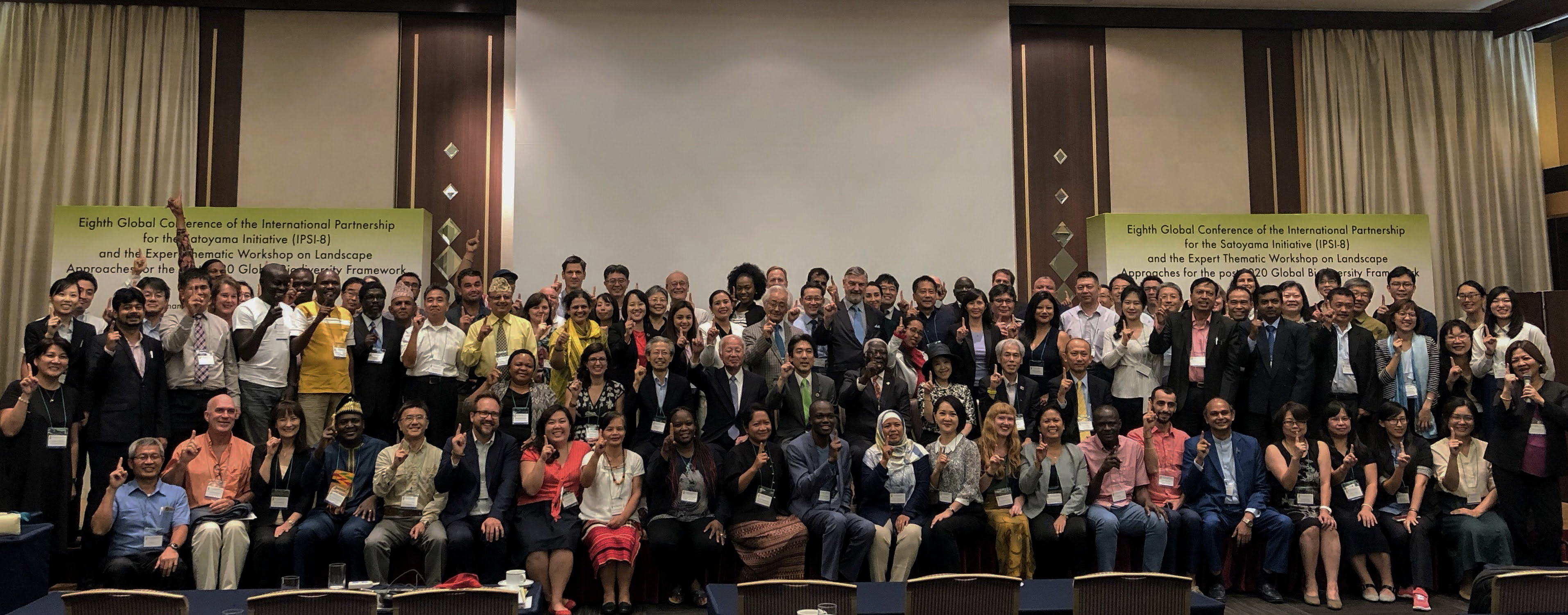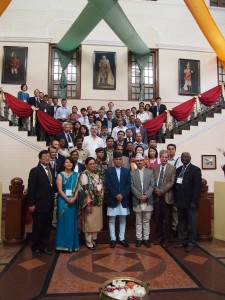From 14-15 May 2013, a wide range of IPSI members and other interested stakeholders gathered in Kathmandu for a two-day workshop on the Satoyama Initiative. A total of 61 experts from 16 different countries attended the workshop, which was co-organized by the Ministry of Forests and Soil Conservation (MoFSC), Government of Nepal and the IPSI Secretariat.
Workshop participants together with Hon. Minister Tek Bahadur Thapa Gharti and other distinguished guests
The two-day regional workshop brought together participants from across Asia, and was inaugurated by Hon. Minister Tek Bahadur Thapa Gharti of the MoFSC Nepal, who performed the ceremonial lighting of the traditional lamp and watering of the plant. In his remarks, the Hon. Minister shared that the Government of Nepal is currently in the process of revising its National Biodiversity Strategy and Action Plan (NBSAP) and would be promoting the Satoyama Initiative in regards to conservation and sustainable use of biodiversity. In addition, he underscored Nepal’s full commitment to work on the local and regional level to achieve the three objectives of the Convention on Biological Diversity.
Following his opening remarks and additional encouraging remarks from Dr. David Molden (Director General, International Centre for Integrated Mountain Development (ICIMOD), Mr. Kazu Takemoto (Director, IPSI Secretariat), and Prof. Alfred Oteng-Yeboah (Chair, IPSI Steering Committee), the plenary session proceeded with a vote of thanks to the Hon. Minister delivered by the workshop’s co-chairs, Ms. Yoko Watanabe (Programme Manager, Senior Biodiversity Specialist, Secretariat of the Global Environment Facility) and Dr. Krishna Chandra Paudel (Secretary, MoFSC Nepal). In addition, the workshop’s three objectives were introduced, namely: (1) To share information and experiences from the Asian region relevant to the Satoyama Initiative; (2) To further promote IPSI activities and understanding of the partnership in the region; (3) To contribute to the further development of the IPSI Strategy and Plan of Action.
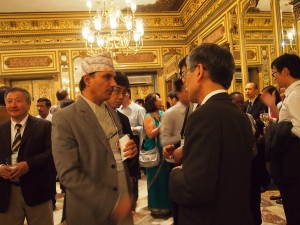 Hon. Minister Tek Bahadur Thapa Gharti and Workshop Co-chair Ms. Yoko Watanabe during Evening Reception
Hon. Minister Tek Bahadur Thapa Gharti and Workshop Co-chair Ms. Yoko Watanabe during Evening Reception
To frame the day’s discussions, three plenary presentations were delivered. First, Dr. Gopal S. Rawat (Chief Scientist, Ecosystem Services, ICIMOD) introduced the transboundary landscape approach that ICIMOD has been promoting throughout the Hindu Kush-Himalayan region. Using four specific examples of mega-transects that encompass multiple countries, Dr. Rawat explained the complexity and potential for effective protected area management through using a transboundary approach.
A second plenary presentation was delivered by Mr. Gopal Raj Sherchan (National Coordinator, The GEF Small Grants Programme, Nepal) who introduced activities under the Community Development and Knowledge Management for the Satoyama Initiative (COMDEKS) project, which is currently being implemented in 10 countries, including Nepal. Mr. Sherchan highlighted the role that indicators of resilience have played in establishing baselines, which are being conducted in a participatory manner to develop a five-year implementation strategy.
The final plenary presentation of the morning was delivered by Mr. Megh Nath Kafle, Officer of the District Soil Conservation, Nepal, who introduced how Nepal’s community-managed landscapes have been supporting the conservation of biodiversity. Among other things, Mr. Kafle emphasized commonalities between Japanese and Nepalese landscapes, and underscored the importance of mosaic landscapes, while drawing attention to both vertical and horizontal linkages across such landscapes. In addition, he highlighted existing challenges facing landscapes in Nepal and the importance of an integrated approach to managing forests, farmland, ecotones, water and soil to ensure conservation of biodiversity.
Following the plenary presentations, workshop participants shared their expectations for the workshop, which the Secretariat then classified into a range of different categories to present to the plenary. Expectations ranged from learning about other participants’ experiences working with landscapes to gaining a deeper understanding of the Satoyama Initiative and IPSI. Some participants highlighted interests in how IPSI’s work connects with the objectives of the CBD and the potential for establishing more effective collaborative partnership.
To foster dialogue among the diverse participants, the plenary subsequently divided into three sub-groups led by experienced facilitators and tasked over the remainder of the workshop with three main topics:
a) Sharing experiences on socio-ecological production landscapes and seascapes (SEPLS) in Asia;
b) Identifying the main challenges and opportunities of working with SEPLS;
c) Opportunities with IPSI to address identified challenges.
A lively and dynamic discussion followed, intercut with plenary sessions to share outcomes from each group. In line with the regional workshop’s objectives, participants shared information and experiences from the Asian region relevant to the Satoyama Initiative, there were opportunities for further promoting IPSI activities and understanding of the partnership within the region, and the expert insight provided by the participants contributed directly to the further development of the IPSI Strategy and Plan of Action.
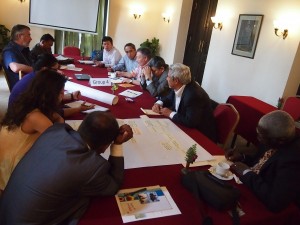 Participants engaging in small group discussions
Participants engaging in small group discussions
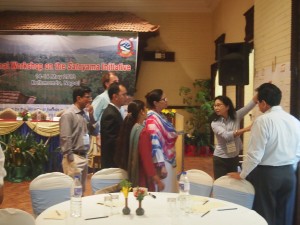 Group preparing to introduce outcomes of discussion at plenary session
Group preparing to introduce outcomes of discussion at plenary session
Summarizing the outcomes of the workshop, the co-chairs highlighted a number of areas for further attention as IPSI continues to develop institutionally as well as on-the-ground. Among other things, participants’ recommendations mentioned in the co-chairs’ summary included:
- A need to continue trying to identify and map landscapes similar to Japan’s satoyama around the world;
- The continued importance of expanding and strengthening networks;
- Further development and clarifications of fundraising strategies at national and local level to promote landscape-level activities;
- Further consideration of how to build capacity and understanding of landscapes and conservation;
- When undertaking concrete activities, cultural values and traditional knowledge should be built upon to promote and conserve nature, while equality and gender issues should be taken into full account;
- Potential tie-ins to the climate change community can be considered in further detail at various levels (local, national, etc.)
In closing remarks, the Director of the IPSI Secretariat, Mr. Kazu Takemoto, extended his appreciation for the active participation and dynamic discussions. At the same time, he emphasized how impressed he was by the professional and personal commitment of the participants, while expressing his confidence that IPSI would be able to continue moving forward based on the suggestions provided during the regional workshop.
As the regional workshop drew to a close, Dr. Krishna Chandra Paudel (MoFSC Nepal) echoed his appreciation and left all of the participants with a final sentiment: “Biodiversity is a business for all, and every day is a biodiversity day.”
—
On the day following the conclusion of the workshop (16 May 2013), the workshop organizers provided overseas participants with the opportunity to experience Nepal’s SEPLS firsthand with visits to Janagal, Kavre and Kushadevi, Kavre.
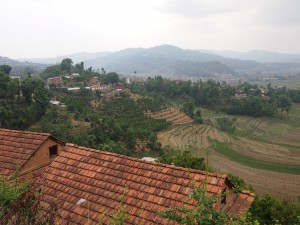 Mosaic landscapes in rural Nepal
Mosaic landscapes in rural Nepal
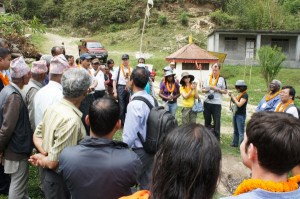 Dr. Krishna Chandra Paudel (Secretary, MoFSC Nepal) guiding an excursion for workshop participants
Dr. Krishna Chandra Paudel (Secretary, MoFSC Nepal) guiding an excursion for workshop participants
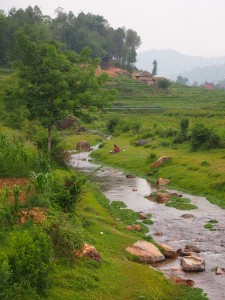 One of Nepal’s mosaic landscapes
One of Nepal’s mosaic landscapes



